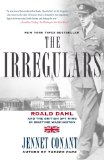Summary | Excerpt | Reviews | Beyond the Book | Readalikes | Genres & Themes | Author Bio

Roald Dahl and the British Spy Ring in Wartime Washington
by Jennet Conant1
THE USUAL DRILL
"Don't you think that you or some other regular officer should be doing this job?"
"We've all got our hands full," the Captain said.
-- Roald Dahl, Going Solo
It was an unseasonably warm spring evening in 1942, and between the cherry blossoms and soldiers in uniform, brightly lit shopwindows and partly darkened government buildings, wartime Washington was a strange sight. Four months had passed since the Japanese attack on Pearl Harbor. The grim task of mobilization had clearly begun, and the streets were riddled with Quonset huts and hastily constructed plywood office complexes. But these were the only outward signs of conflict. In the eyes of a newly arrived Englishman, life in the capital appeared almost normal. Back in London, there was not a light to be seen in the bomb-shattered streets, where blackout shades were kept drawn against the nightly air attacks, and people fumbled home from work in the permanent gloom. The Battle of Britain, Germany's first air assault on England, intended to pummel them into submission prior to invasion, had been won the previous fall, but only just, and the city had paid a hell of a price. Here in America, among all the cheery reminders of the uninterrupted Easter holiday, it was hard to tell that there was a war on and that there were far-flung battlegrounds -- desert, jungle, and ocean -- where England had been fighting for her life the past two and a half years.
Flight Lieutenant Roald Dahl had decidedly mixed feelings about his new posting in the United States. He had turned twenty-five that September and was thoroughly disgusted with himself for being invalided out of the war so soon. His sense of failure was only intensified by the thought of the friends in his old squadron who were still in the thick of it. He knew that at one level he should be grateful. The life expectancy of an RAF pilot was not long, and he was lucky to be alive. On the other hand, the idea that he might have to sit out the rest of the war as a spectator, one of the "whiskey warriors" in Washington, was too awful to contemplate. Everyone knew the diplomatic service was just one of the more respectable ways of dodging the draft. It was "a rotten job," and he wanted no part of it, but then he was in no position to argue.
Dahl had been working for the Shell Oil Company in East Africa when England declared war on Germany in September 1939, and like most men of his age, he had been in a hurry to enlist. Two months after the fighting started, he quit his job and drove six hundred miles across jungle roads from Dar es Salaam to Nairobi to report to the small headquarters the Royal Air Force maintained in Kenya. After taking one look at him, the medical officer advised that at six feet six inches, Dahl was not exactly "the ideal height" for a fighter pilot. It was not hard to see what they were getting at: in order to fit his attenuated frame into the tiny cockpit of a military airplane, he was forced to curl up almost into a fetal position, with his knees tucked tightly under his chin. When he climbed into the open cockpit of a Tiger Moth for the first time and took his seat on the regulation parachute pack, his entire head stuck out above the windshield like some kind of cartoon character. But he was not easily deterred. The war had just begun, pilots were in demand, and in the end the RAF was not too fussy to take him.
Dahl spent the next two months at the RAF's run-down, little initial training school learning to fly over the dusty plains of Kenya. He discovered that flying the aerobatic Tiger Moths was easier than it looked, and he quickly learned to coax the small, single-engine biplanes into vertical spins, flips, and graceful loop-the-loops at a touch of the rudder bar, all of which, he wrote home, "was marvelous fun." Once he had mastered the basics, he was sent on to Iraq, to a large, desolate RAF outpost in Habbaniya, about one hundred miles south of Baghdad, where it was so fiendishly hot that the pilots could practice flying only from dawn to ten a.m. He spent another six months there learning how to handle Hawker Harts, military aircraft with machine guns in their wings, and practiced shooting down Germans by firing at canvas targets towed behind another airplane.
Copyright © 2008 by Jennet Conant




Asking a working writer what he thinks about critics...
Click Here to find out who said this, as well as discovering other famous literary quotes!
Your guide toexceptional books
BookBrowse seeks out and recommends the best in contemporary fiction and nonfiction—books that not only engage and entertain but also deepen our understanding of ourselves and the world around us.